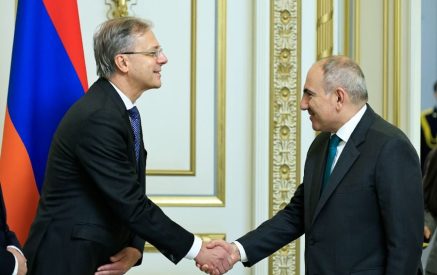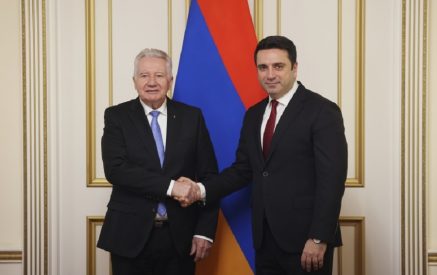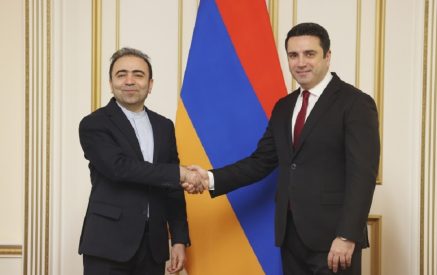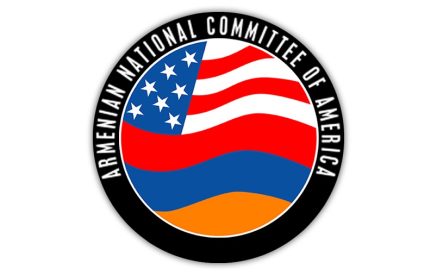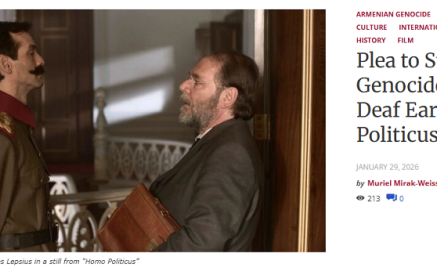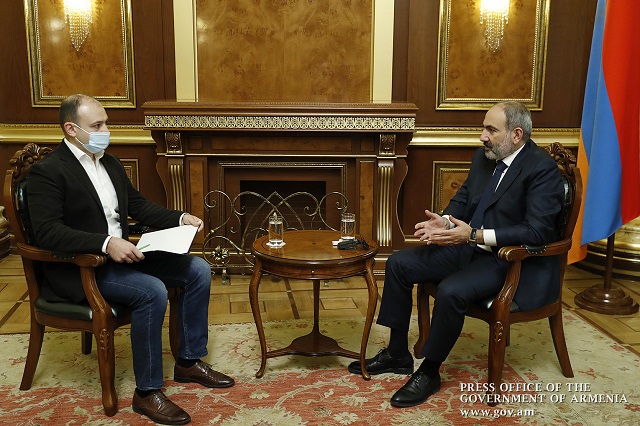Prime Minister Nikol Pashinyan gave an interview to the Russian Interfax news agency, which is presented below.
Interfax – Mr. Prime Minister, yesterday you said that the Karabakh issue has no diplomatic solution, at least at this stage. What does this statement mean?
Prime Minister Nikol Pashinyan – The ceasefire agreements have been thwarted at least twice in the conflict zone. Of course, Azerbaijan blames the Armenian side for this, saying that we violated the agreement. But we know where the truth is. A diplomatic solution implies compromise.
The point is that the background of the negotiation process and specifically the negotiations held in recent years have shown that when Armenia states that some concessions are acceptable, Azerbaijan rejects them although they seemed to be acceptable before. At the moment when Armenia expresses its readiness for a compromise, Azerbaijan demands more. And this has been going on for a long time. I just meant that it seems to be unrealistic to talk about a diplomatic solution unless Azerbaijan changes its approach. But diplomatic work is needed to change this position of Azerbaijan. And in this respect, I appreciate the efforts exerted by the OSCE Minsk Group co-chairs, including Russia.
Read also
Interfax – So, at this stage, we can state that diplomatic efforts continue and will continue in the future.
Prime Minister Nikol Pashinyan – Yes, of course. We need to come to some decisions as quickly as possible. But especially considering that two agreements, I mean the Moscow ceasefire agreement and the one reached at the initiative of the French President, when everything seemed to have been agreed, I do not believe that a quick diplomatic solution is real. But this does not mean that I do not want it, I am not ready to invest all the necessary efforts to that end. This is my objective assessment of Azerbaijan’s position. And this is not so much the position of Azerbaijan as the position of Turkey, which is reflected in the position of Azerbaijan.
Interfax – Armenian Foreign Minister Zohrab Mnatsakanyan was in Moscow yesterday. Are there any new agreements reached during the visit? Tomorrow Mnatsakanyan will meet with U.S. Secretary of State Mike Pompeo. What are your expectations?
Prime Minister Nikol Pashinyan – No specific agreements. Diplomatic work is underway and will continue ahead. Armenia is prepared, has always been ready and will be ready for compromise-based solutions.
Interfax – What concessions are you prepared for? Can we talk about the transfer of seven districts to Azerbaijan or withdrawal of Armenian armed forces from the security zone around Nagorno-Karabakh?
Prime Minister Nikol Pashinyan – Now as hostilities are raging in the conflict zone, it would be inappropriate to discuss such issues. The self-defense forces of Nagorno-Karabakh are in trenches and right now the forces of terrorist groups that were moved to Azerbaijan from Turkey are attacking the positions of the self-defense forces of Nagorno-Karabakh.
You understand the situation of those people who are fighting there, by the way, not against the Azerbaijani troops, but against terrorists, when I say that we are ready to compromise with these terrorists. I said that we are ready for a compromise with Azerbaijan.
And for us, a very important and principal issue is the status of Nagorno-Karabakh. But the whole process is out of the context of the Nagorno-Karabakh problem. The first thing we must do is to bring the process back into the mainstream of negotiations on Nagorno-Karabakh.
The presence of terrorists will have specific consequences not only for our region, but also for countries nearby. Unfortunately, despite the fact that the regional countries have officially recognized the presence of terrorist groups in the Karabakh conflict zone, they have not yet taken concrete anti-terrorist actions. This is the main point, the main obstacle that prevents us from coming to a diplomatic solution.
First you need to solve the terrorist issue, because if they succeed here, they will go further south and north; this is their professional activity to terrorize, destabilize; they do not care that much about where to do it.
Interfax – You said, “solve the terrorist issue.” How? Mere statements and reactions coming from different countries do not seem to have brought about a turning point.
Prime Minister Nikol Pashinyan – Yes. For example, a counter-terrorism operation. This is one option.
Interfax – You mean by the Armenian side?
Prime Minister Nikol Pashinyan – No. The forces of Nagorno-Karabakh are doing this as much as possible. Now they are fighting on three fronts – against the Azerbaijani army, against the Turkish army and against terrorists. But I think this is a question not only for me, because we, of course, support anti-terrorist actions as much as possible. I think that the countries whose national security is threatened will have to intervene.
Interfax – Among these countries we can mean Russia and Iran. Did you held a dialogue to that effect with them?
Prime Minister Nikol Pashinyan – Of course, first of all, the interests of Russia are affected. I would like to draw your attention to the fact that during this war we witnessed at least two cases when anti-terrorist operations were carried out in the North Caucasus; Russian officials said they had come from Syria.
Prior to this, the Russian Foreign Intelligence Service stated that terrorists were involved in the conflict zone. These two statements are interrelated. The question is whether the Russian services will be waiting until terrorists arrive in Russia, or is it necessary to pursue a preventive policy?
If the terrorists succeed in Nagorno-Karabakh, then they will look for new footholds and areas of action. It is up to the Russian Federation to decide. But on these issues we had consultations with our Russian colleagues, and we expressed our point of view.
Interfax – Do you mean that that pre-emptive action can be carried out both in Nagorno-Karabakh and Azerbaijan? Can this be considered as an invitation for a third party to intervene in the conflict?
Prime Minister Nikol Pashinyan – We need to understand what a third party means. Russia co-chairs the OSCE Minsk Group, and on the other hand, it is Armenia’s strategic ally, and the Russian President has stated that Russia will honor the security-related commitments in its relations with Armenia. This is already an issue that needs further consideration.
There are many nuances here. I say that the situation in Nagorno-Karabakh has long gone beyond the framework of the Karabakh problem, and in fact, many foreign partners have officially recognized this. I believe and hope that there will be further reaction in the same spirit.
Interfax – Today the President of Azerbaijan said that he is not against the introduction of peacekeepers in the region, but he will set forth his own conditions. I would like to know your opinion on the possible deployment of peacekeepers. The contingents of which countries can enter the peacekeeping force, under whose auspices?
Prime Minister Nikol Pashinyan – For us the deployment of peacekeepers is acceptable. I can say that Azerbaijan’s ideas on the composition of peacekeepers will not coincide with Armenia’s ideas on this issue. If we talk about compromise, the presence of Russian peacekeepers may also be a compromise.
The Russian Federation has good relations with both Azerbaijan and Armenia. It is crucial to reckon with the views of other regional countries, it is important that the peacekeeping forces bring stability to the region, and not vice versa.
Interfax – Aliyev next stated that there can be no referendum in Nagorno-Karabakh, but did not rule out the possibility of cultural autonomy. Your comment.
Prime Minister Nikol Pashinyan – There is nothing new in this position. This is a position that has been voiced for 15-20 years. It is unacceptable to us. The right to self-determination of the people of Nagorno-Karabakh must be protected and respected.
Interfax – Are you ready for a meeting with the President of Azerbaijan, are such preparations underway and have you received an invitation already?
Prime Minister Nikol Pashinyan – There was no official invitation, but as far as I can understand, Aliyev has confirmed his readiness to meet and try to reach a diplomatic solution to this situation. Of course, I am ready, but some necessary prerequisites are needed for a fruitful meeting.
Interfax – Where can the meeting take place?
Prime Minister Nikol Pashinyan – In Moscow.
Interfax – On what terms? What do substantive negotiations mean from Yerevan’s perspective?
Prime Minister Nikol Pashinyan – This means a final solution to the Nagorno-Karabakh problem.
Interfax – Is it Nagorno-Karabakh’s independence, or its unification with Armenia?
Prime Minister Nikol Pashinyan – This is the observance of the right and protection of the right to self-determination of the people of Nagorno-Karabakh.
Interfax – Do you think it possible to change the format of negotiations? Is Turkey’s involvement in the negotiation process possible, which Baku insists on?
Prime Minister Nikol Pashinyan – This is a strange position, because a statement was adopted in Moscow by the foreign ministers of Russia, Armenia and Azerbaijan, which clearly stated that the OSCE Minsk Group format would not change. The negotiations should continue in this format. In fact, I say that Azerbaijan every time changes its position. This issue was agreed upon in the Moscow joint statement, but after that Azerbaijan again insisted that Turkey should be a co-chair. How can work be made fruitful in a situation where Azerbaijan is changing the already agreed positions and issues?
Interfax – Do you think Armenian-Turkish reconciliation is possible, or is everything already lost?
Prime Minister Nikol Pashinyan – We have always said that Armenia is ready to establish diplomatic relations without preconditions. Of course, these events and the war added tension to relations, but we are prepared to hold diplomatic discussions both with Azerbaijan and Turkey.
Interfax – Turkey is a NATO member and is actively supporting Azerbaijan. Could the escalation of the conflict lead to a confrontation between Russia and NATO?
Prime Minister Nikol Pashinyan – I do not think so, because it seems to be obvious that Turkey is acting here not as a NATO representative, but as a country that plays a destabilizing role not only in the South Caucasus, but also in its relations with other NATO members, Greece for instance. Greece is a NATO member, but Turkey is taking steps that have already generated tensions with Greece.
Interfax – Do you think that Russia could persuade Turkey not to interfere in the Karabakh conflict? Have you discussed this issue with Vladimir Putin?
Prime Minister Nikol Pashinyan – Russian officials have repeatedly stated their position on this issue and we have concurred with their position. I cannot say right now how convincing Russia’s steps or position will be.
I have already said that the situation goes far beyond the framework of the Karabakh problem. This is a broader issue. It concerns not only Armenia’s relations with Russia, Azerbaijan and Turkey, but it also has to do with the relations between Russia and Turkey, specifically as regards our region.
A lot is being decided here, and depending on what decisions and what kind of situation we come to, it will have consequences not only for the countries in the South Caucasus, but also for other countries. These countries should perceive the situation from this point of view.
We need to ponder all possible consequences, and we need to take such specific steps as may prevent the adverse impact of negative scenarios.
Interfax – In case of further escalation when hostilities encompass the entire border between Armenia and Azerbaijan, will you seek assistance from the CSTO and Russia?
Prime Minister Nikol Pashinyan – We have already informed our CSTO colleagues about the current situation. Russia has stated that Moscow will respect its commitments to Armenia in the security sphere. Should the situation develop this way, Armenia will indeed address the issue to the CSTO or maybe directly to Russia.
Interfax – The last step, after which there will be no return to negotiations, will be the recognition of the independence of Nagorno-Karabakh. When will the red line come, after which you will do it? By the way, yesterday Turkish vice president Fuat Oktay stated that his country will send troops to Nagorno-Karabakh if such a request comes from Azerbaijan.
Prime Minister Nikol Pashinyan – They have already sent their troops. This is a matter of formal or informal wording. That statement by Fuat Oktay is Turkey’s response to the discussion about the presence of Russian peacekeepers in this region. Armenia does not aim to be the only country to recognize the independence of Nagorno-Karabakh. We strive to get the international community to recognize the independence of Nagorno-Karabakh.
Interfax – The former presidents of Armenia and Nagorno-Karabakh have been holding active consultations on Karabakh in recent days. Are you involved in this process somehow?
Prime Minister Nikol Pashinyan – I have been informed about the meetings and their content. The second and third presidents of Nagorno-Karabakh contacted and informed me about the discussions and the objectives sought.
Interfax – Do you think these meetings are useful?
Prime Minister Nikol Pashinyan – I do not consider them harmful.
Interfax – In short, where is the key to the Nagorno-Karabakh settlement?
Prime Minister Nikol Pashinyan – The key to settlement consists in compromise, in a more proactive involvement of the OSCE Minsk Group co-chairs, in particular Russia.
Interfax – How did the war affect the economy?
Prime Minister Nikol Pashinyan – War never works well for the economy. It has had a negative impact.
Interfax – Since January 2021, Armenia will ban the import of goods from Turkey for six months. According to the published list, there is a huge number of names of various goods. How negatively will this affect the Armenian economy?
Prime Minister Nikol Pashinyan – We hope that it will have a positive impact. This is an important political decision. Our economy must respond to Turkey’s destructive policies.
Interfax – Do you expect help from Russia, if not in military, then in financial terms? Can Russia provide relief, provide a loan, or set preferential energy prices? In the run-up to this latest flare-up, you negotiated a reduction in gas prices. Were these issues discussed with the Russian premier during his visit to Yerevan?
Prime Minister Nikol Pashinyan – Of course, we discussed economic issues. Now we feel the support of Russia, and I am confident that Russia will continue to support us wherever possible.
INFORMATION AND PUBLIC RELATIONS DEPARTMENT OF THE OFFICE OF THE PRIME-MINISTER OF THE REPUBLIC OF ARMENIA









































